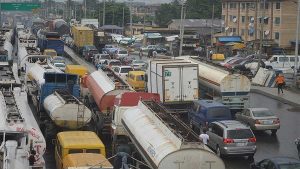Stakeholders Canvass Scrapping Of Multiple Lagos Barracks For Truck Terminals

As part of efforts to put an end to the pangs of businessmen, residents and other stakeholders at Nigeria’s premier port caused by the traffic gridlock in Apapa, truckers have admonished the Federal Government to demolish the numerous military barracks in Lagos State and convert these facilities to truck parks.
This call was made at a recent stakeholders’ summit organized by the National Association of Government Approved Freight Forwarders (NAGAFF) on trucking and the recent astronomical increase in freight rates in the country.
According to the Chairman of the Association of Maritime Truck Owners (AMATO) Chief Remi Ogungbemi, the enormous portions of land used to build the numerous military barracks around the port environment could be transformed to truck parks in order to solve the perennial problem of traffic gridlock at Lagos ports.
He stressed that the nation was not in a war to warrant such proliferation of military barracks around the port city, adding that the establishment of truck parks should be sacrosanct rather than the propagation of military quarters.
“One of these barracks when converted to holding bays could handle about 7,000 units of trucks and without the right infrastructures in place, the traffic situation within the port environment would remain static. No matter the number of military personnel deploy to the access roads, I want to state categorically that they will not find any lasting solutions to the problem of traffic except the right infrastructures are provided” he said.
Meanwhile, the Founder of NAGAFF, Dr. Boniface Aniebonam also endorsed the idea, even as he stated that the association would collaborate with the trucking groups to develop a comprehensive document containing the solutions to the traffic menace.
Aniebonam described the current situation in Apapa and its environs as a “system collapse”, lamenting that the Vice President, Yemi Osinbajo’s visit to the seaport in Lagos wouldn’t yield the desired results as the critical stakeholders at the ports weren’t informed to enable them brief the Vice President on the state of the roads.
However, he assured that haulage operators that the newly constituted Governing Council of the Council for the Regulation of Freight Forwarding in Nigeria (CRFFN) had plans to expand the membership of CRFFN to include truckers and terminal operators.
He maintained that the freight forwarding associations are united and wouldn’t shy away from more drastic actions such as protests, if the ‘strong-worded’ letter to be written to the presidency wasn’t taken seriously.
By Kenneth Jukpor








